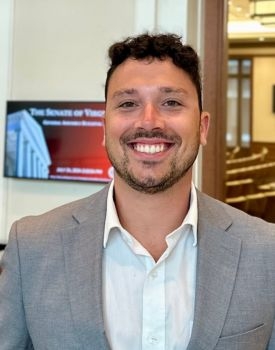Luke Goodman
IGC FELLOW | Global Change Center
Ph.D. Student • Planning, Governance, and Globalization
Research Interests: Policy innovations, responses, and processes for global challenges, including antimicrobial resistance and the renewable energy transition
Advisor: Dr. Todd Schenk
lmgoodman@vt.edu • CV

Luke is a PhD student in Planning, Governance, and Globalization under the advisement of Dr. Todd Schenk in the Science-Policy Interface Lab. His academic pursuits include harnessing scientific knowledge and expertise to foster evidence-based decision-making. Luke’s research is specifically focused on policymaking that seeks to address intricate global challenges, including antimicrobial resistance and the urgent need for transitioning to renewable energy systems as a means to mitigate climate change.
With an M.S. in Biological Systems Engineering from Virginia Tech where he studied under Dr. Durelle Scott (August 2023) and a B.S. in Ecology and Environmental Studies from Iowa State University (December 2019), Luke has gained a comprehensive understanding of socio-ecological systems and the myriad of challenges they face, with a particular emphasis on water resources. These experiences equipped him with a firm foundation and technical background in environmental and ecological science and engineering, which he intends to leverage in his dissertation research as well as his future career as a political advisor within the federal government or international agencies.
Luke’s previous research experiences encompass a broad spectrum of water resource management strategies that balance societal needs and concerns with environmental restoration and conservation. He has worked on projects simulating management practices for large river systems (i.e., Chesapeake Bay, Mississippi River, and Missouri River watersheds) to enhance water quality, mitigate or manage flooding, and increase biodiversity. His M.S. work consisted of two distinct projects: (1) watershed-scale stream restoration modeling aimed to bolster water quality and flood management within the Chesapeake Bay watershed, and (2) analyzing hydrologic, geophysical, and biogeochemical drivers of denitrification in rivers and their floodplains using a random forest machine learning approach.
Luke’s experience as an IGC Fellow and within the broader GCC community has already proved to be instrumental in broadening his perception of the role of science and scientists in policymaking. He looks forward to continuing to foster interdisciplinary collaborations with fellow IGC Fellows and GCC faculty to help address some of the wicked problems facing our intertwined socio-ecological systems.






